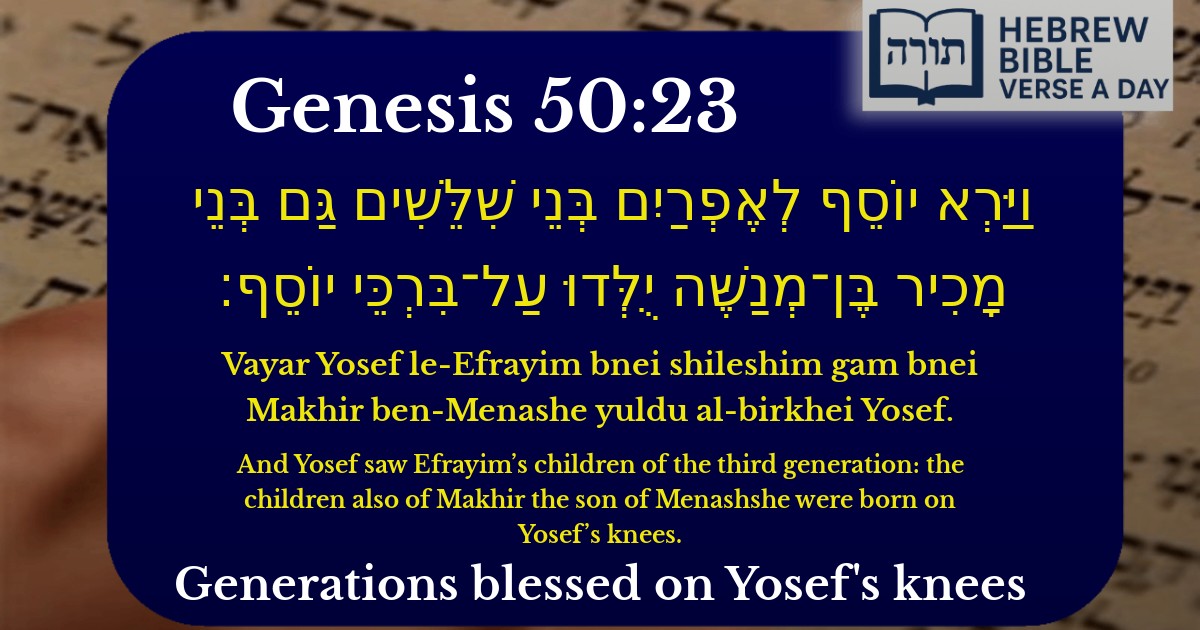Frequently Asked Questions
Q: What does it mean that Yosef saw Efrayim's children of the third generation?
A: This verse shows that Yosef lived long enough to see his great-grandchildren through his son Efrayim. According to Rashi, this was a special blessing, as it is rare for someone to live to see three generations of their descendants. It fulfilled the promise of long life and prosperity that Yosef received for his righteousness.
Q: Why is it significant that children were born 'on Yosef’s knees'?
A: The phrase 'born on Yosef’s knees' is a Hebrew idiom meaning that Yosef took an active role in raising and educating these children, as if they were his own. The Talmud (Bava Batra 143a) explains that this shows Yosef’s deep involvement in their upbringing, ensuring they would continue in the ways of their forefathers.
Q: What lesson can we learn from Yosef seeing his great-grandchildren?
A: The Midrash teaches that seeing one’s descendants is one of the greatest blessings a person can receive. Yosef’s longevity and the continuity of his family highlight the importance of raising righteous children and grandchildren who carry on Jewish tradition. It also shows that Hashem rewards those who remain faithful even in difficult circumstances, as Yosef did in Egypt.
Q: How does this verse connect to the blessings Yosef received earlier in the Torah?
A: Earlier, Yaakov blessed Yosef’s sons, Efrayim and Menashe, saying they would become great tribes (Genesis 48). This verse shows the fulfillment of that blessing, as Efrayim’s descendants multiplied into a large family. The Ramban explains that this was a sign of Yosef’s enduring legacy in Klal Yisrael.
Q: Why does the Torah mention Makhir the son of Menashe separately?
A: Rashi explains that Makhir was a particularly righteous descendant of Menashe, and his children being born 'on Yosef’s knees' shows that they were raised with special care. The Talmud (Sotah 13b) also notes that Makhir later played a key role in settling the Land of Israel, showing the importance of proper education in shaping future leaders.


Understanding the Verse in Context
The verse (Bereishit 50:23) describes Yosef's longevity and his witnessing of multiple generations of his descendants. This is seen as a fulfillment of the blessing he received earlier in his life, demonstrating Hashem's favor and the continuity of his lineage. The phrase "born on Yosef’s knees" carries deep significance in Jewish tradition, as discussed by commentators.
Rashi's Explanation
Rashi explains that "born on Yosef’s knees" refers to Yosef raising and educating these children as if they were his own. This reflects the concept of chinuch (education) and the transmission of values to future generations. Rashi also notes that Yosef merited to see his great-grandchildren, a rare blessing indicating his righteousness and long life.
Ibn Ezra's Insight
Ibn Ezra emphasizes the literal meaning—that Yosef held his grandchildren on his knees as a sign of affection and involvement in their upbringing. This physical act symbolizes his active role in ensuring the continuity of his family's spiritual legacy.
Midrashic Interpretation
The Midrash (Bereishit Rabbah 100:11) connects this verse to the broader theme of zechut avot (merit of the ancestors). It teaches that Yosef's merit extended to his descendants, allowing them to thrive. The Midrash also highlights that Yosef's ability to see future generations was a reward for his steadfast faith during his trials in Egypt.
Rambam's Perspective
Rambam (Hilchot Teshuva 3:4) alludes to this verse when discussing the rewards for righteousness. He explains that one of the greatest blessings is seeing one's children and grandchildren following the righteous path, as Yosef experienced.
Key Themes